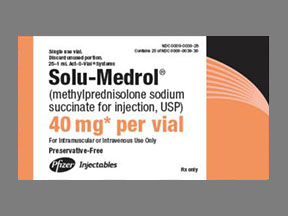
Solu-medrol (pf) Coupons & Savings Card – Discount Prices from $148.21
My prescription
Edit
40MG, Solu-medrol (pf) (30 Solution Reconstituteds)
Select pharmacy

CVS
$184.64
COUPON PRICE
Walmart
$148.21
COUPON PRICE
Albertsons
$168.08
COUPON PRICE
Walgreens
$168.08
COUPON PRICESolu-medrol (pf) savings card
Show this card to your pharmacist
Walmart
$148.21
BIN
ID
PCN
GRP
019876
LHBDD09F2F
CHIPPO
LHX
Powered by
Price history for Solu-medrol (pf)
30 Solution Reconstituteds, 40MG
Average retail price for Solu-medrol (pf)
Average SaveHealth price for Solu-medrol (pf)
Our price history data is based on aggregated prescription data collected from participating pharmacies in America. Our prescription data updates daily to reflect the latest price changes. If you notice a missing data point, it means there wasn't sufficient data available to generate a monetary value for that date.
*Retail prices are based on pharmacy claims data, and may not be accurate when we don't have enough claims.
Solu-medrol (pf) dosage forms
Dosage Quantity Price from Per unit 40MG 30 Solution Reconstituteds $148.21 $4.94 40MG 60 Solution Reconstituteds $315.41 $5.26 40MG 90 Solution Reconstituteds $482.61 $5.36 125MG 30 Solution Reconstituteds $247.73 $8.26 125MG 60 Solution Reconstituteds $507.46 $8.46 125MG 90 Solution Reconstituteds $767.19 $8.52 500MG 30 Solution Reconstituteds $1428.23 $47.61 500MG 60 Solution Reconstituteds $2868.47 $47.81 500MG 90 Solution Reconstituteds $4308.70 $47.87 1000MG 30 Solution Reconstituteds $2083.00 $69.43
| Dosage | Quantity | Price from | Per unit |
|---|---|---|---|
| 40MG | 30 Solution Reconstituteds | $148.21 | $4.94 |
| 40MG | 60 Solution Reconstituteds | $315.41 | $5.26 |
| 40MG | 90 Solution Reconstituteds | $482.61 | $5.36 |
| 125MG | 30 Solution Reconstituteds | $247.73 | $8.26 |
| 125MG | 60 Solution Reconstituteds | $507.46 | $8.46 |
| 125MG | 90 Solution Reconstituteds | $767.19 | $8.52 |
| 500MG | 30 Solution Reconstituteds | $1428.23 | $47.61 |
| 500MG | 60 Solution Reconstituteds | $2868.47 | $47.81 |
| 500MG | 90 Solution Reconstituteds | $4308.70 | $47.87 |
| 1000MG | 30 Solution Reconstituteds | $2083.00 | $69.43 |
| 1000MG | 60 Solution Reconstituteds | $4177.99 | $69.63 |
| 1000MG | 90 Solution Reconstituteds | $6272.99 | $69.70 |
Solu-medrol (pf) Warnings
When considering the use of Solu-Medrol PF (methylprednisolone sodium succinate), it's important to be aware of several safety warnings and potential risks:
Serious Neurologic Events with Epidural Administration: Administering corticosteroids like Solu-Medrol PF via epidural injection has been linked to severe neurological complications, including spinal cord infarction, paralysis, blindness, and stroke. These events have occurred regardless of fluoroscopy use. The safety and effectiveness of epidural corticosteroid administration have not been established, and such use is not approved.
Benzyl Alcohol Toxicity: Some formulations of Solu-Medrol PF contain benzyl alcohol as a preservative. High doses of benzyl alcohol can be toxic, particularly in neonates, leading to serious conditions like metabolic acidosis and, in severe cases, death. It's crucial to consider the total amount of benzyl alcohol administered, especially in vulnerable populations.
Injection Site Reactions: Injecting Solu-Medrol PF may cause skin and tissue changes at the injection site, such as depressions or atrophy. To minimize these effects, avoid exceeding recommended doses and refrain from injecting into the deltoid muscle due to a higher risk of subcutaneous atrophy.
Hypersensitivity Reactions: Rare instances of severe allergic reactions, including anaphylaxis, have been reported with corticosteroid therapy. If you experience symptoms like difficulty breathing, swelling, or rash after receiving Solu-Medrol PF, seek immediate medical attention.
Cardiovascular Risks: High doses of corticosteroids can lead to elevated blood pressure, fluid retention, and potassium loss. These effects may necessitate dietary adjustments, such as salt restriction and potassium supplementation. Additionally, there is an association between corticosteroid use and heart complications, especially in patients with recent heart attacks.
Endocrine Effects: Prolonged use of corticosteroids can suppress the body's natural hormone production, potentially leading to conditions like Cushing's syndrome and elevated blood sugar levels. Monitoring is essential during chronic use to detect and manage these effects.
Increased Infection Risk: Corticosteroids suppress the immune system, increasing susceptibility to infections. This includes a higher risk of new infections, worsening of existing ones, and reactivation of dormant infections like tuberculosis. Patients should be closely monitored for signs of infection during treatment.
Specific Infections: Use of Solu-Medrol PF in patients with latent tuberculosis can lead to reactivation of the disease. Similarly, exposure to varicella (chickenpox) or measles while on corticosteroids can result in severe or fatal outcomes. Preventive measures and prompt treatment are crucial in these scenarios.
Liver Injury: High doses of intravenous methylprednisolone have been associated with a rare but serious form of acute hepatitis, which can lead to liver failure and death. If liver injury occurs, discontinuation of the drug is recommended.
Vaccination Considerations: Live or live-attenuated vaccines are contraindicated in patients receiving immunosuppressive doses of corticosteroids due to the risk of uncontrolled replication of the vaccine virus. Inactivated vaccines may be administered, but their effectiveness could be reduced.
Ophthalmic Effects: Corticosteroid use can lead to eye problems such as cataracts, glaucoma, and increased risk of secondary eye infections. Regular eye examinations are advisable during prolonged therapy.
Kaposi’s Sarcoma: This type of cancer has been reported in patients receiving corticosteroid therapy, particularly those on long-term treatment. Discontinuing corticosteroids may lead to improvement in this condition.
Pediatric Considerations: In children, corticosteroids can affect growth and development. Close monitoring of growth parameters is essential during treatment.
Geriatric Use: Elderly patients may be more susceptible to the adverse effects of corticosteroids, including osteoporosis and increased risk of infections. Cautious dosing and monitoring are recommended in this population.
It's essential to discuss these risks with your healthcare provider to determine if Solu-Medrol PF is appropriate for your condition and to establish a monitoring plan during treatment.
Solu-medrol (pf) Side Effects
Solu-Medrol PF (preservative-free) is a corticosteroid medication used to treat various inflammatory and autoimmune conditions. While effective, it can cause a range of side effects, varying in severity and frequency. Common Side Effects:
- Fluid Retention and Weight Gain: Some individuals may experience swelling due to fluid retention, leading to weight gain.
- Increased Appetite: A heightened sense of hunger is common, which can contribute to weight changes.
- Mood Changes: Users might notice mood swings, anxiety, or irritability.
- Insomnia: Difficulty sleeping or disturbances in sleep patterns can occur.
- Elevated Blood Pressure: An increase in blood pressure levels may be observed.
- Gastrointestinal Issues: Symptoms like nausea, vomiting, or stomach discomfort are possible.
- Skin Changes: Acne, thinning skin, or increased sweating might develop. Serious Side Effects:
- Immune Suppression: The medication can weaken the immune system, increasing susceptibility to infections.
- Osteoporosis: Long-term use may lead to bone thinning, raising the risk of fractures.
- Eye Problems: Conditions such as glaucoma or cataracts can develop.
- Blood Sugar Elevation: There may be an increase in blood sugar levels, which is particularly concerning for individuals with diabetes.
- Muscle Weakness: Some users might experience muscle weakness or loss of muscle mass.
- Gastrointestinal Bleeding: Signs include black or bloody stools and vomiting material that resembles coffee grounds.
- Psychiatric Effects: Severe mood changes, depression, or even psychosis can occur. Injection Site Reactions:
- Pain or Swelling: Discomfort, redness, or swelling at the injection site is possible.
- Skin Changes: Thinning or discoloration of the skin at the injection site may occur. Important Considerations:
- Infection Risk: Avoid contact with individuals who have contagious illnesses like chickenpox or measles, as the medication can increase susceptibility to infections.
- Vaccinations: Consult your doctor before receiving any vaccines, as certain vaccines may not be recommended during treatment.
- Medical History: Inform your healthcare provider of any existing conditions, such as diabetes, hypertension, or osteoporosis, as Solu-Medrol PF can exacerbate these issues. Monitoring and Communication: Regular follow-ups with your healthcare provider are essential to monitor for side effects and adjust treatment as necessary. If you experience any severe or concerning symptoms, contact your doctor promptly.
Solu-medrol (pf) Interactions
When taking Solu-Medrol PF (methylprednisolone sodium succinate), it's important to be aware of potential interactions with other medications, supplements, and certain foods. These interactions can affect how Solu-Medrol PF works or increase the risk of side effects. Always inform your healthcare provider about all the substances you're currently using, including over-the-counter drugs and herbal supplements.
Medications That May Interact with Solu-Medrol PF:
Nonsteroidal Anti-Inflammatory Drugs (NSAIDs): Combining NSAIDs (like Ibuprofen or Aspirin) with Solu-Medrol PF can heighten the risk of gastrointestinal issues, such as ulcers or bleeding.
Potassium-Depleting Agents: Medications like certain diuretics or Amphotericin B can lower potassium levels. When used with Solu-Medrol PF, this may lead to significant potassium loss, increasing the risk of heart rhythm problems.
Anticoagulants (Blood Thinners): Solu-Medrol PF may alter the effectiveness of blood thinners like Warfarin, necessitating close monitoring of blood clotting times to maintain the desired anticoagulant effect.
Antidiabetic Medications: Solu-Medrol PF can raise blood sugar levels, potentially requiring adjustments in the dosages of insulin or oral diabetes medications.
Cyclosporine: Using Solu-Medrol PF with cyclosporine can increase the activity of both drugs, potentially leading to side effects such as convulsions.
Anticholinesterase Agents: For individuals with myasthenia gravis, combining these agents with Solu-Medrol PF may cause severe muscle weakness.
Hepatic Enzyme Modifiers: Drugs that affect liver enzymes can influence how Solu-Medrol PF is metabolized. For instance, certain antifungals and antibiotics can increase Solu-Medrol PF levels, while medications like Rifampin may decrease its effectiveness.
Food and Beverage Interactions:
- Grapefruit Juice: Consuming grapefruit juice may increase the levels of Solu-Medrol PF in your bloodstream, potentially leading to more pronounced side effects. It's advisable to avoid grapefruit juice while on this medication.
Vaccinations:
- Live Vaccines: Solu-Medrol PF can suppress the immune system, reducing the effectiveness of vaccines and increasing the risk of infection from live vaccines. It's generally recommended to postpone live vaccinations until after completing corticosteroid therapy.
General Advice:
Always consult your healthcare provider before starting or stopping any medications or supplements while on Solu-Medrol PF. They can provide guidance tailored to your specific health needs and help you manage potential interactions effectively.
Is Solu-Medrol the same as prednisone?
Solu-Medrol and prednisone are not the same, but they are both corticosteroids used to reduce inflammation. Solu-Medrol contains methylprednisolone, while prednisone is a different corticosteroid. They have similar effects but may be used in different situations or administered differently.
What is Solu-Medrol injection used for?
Solu-Medrol injection is used to treat a variety of conditions, including inflammation, severe allergies, flares of chronic illnesses, and certain types of cancer. It is also used to manage symptoms of multiple sclerosis and to treat conditions that affect the skin, eyes, lungs, stomach, nervous system, and blood cells.
What is another name for SOLU-MEDROL?
Another name for SOLU-MEDROL is methylprednisolone sodium succinate.
Where is Solu-Medrol injection given?
Solu-Medrol injection can be administered in several ways depending on the condition being treated. It can be given intravenously (into a vein), intramuscularly (into a muscle), or directly into a joint or lesion. The specific method and site of administration should be determined by a healthcare professional based on the patient's medical needs.
